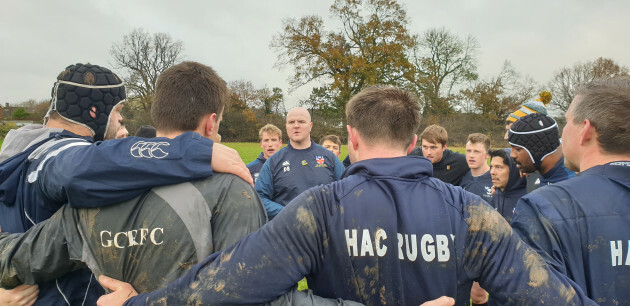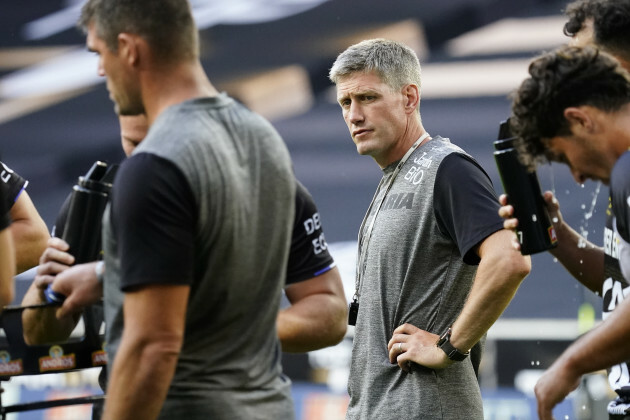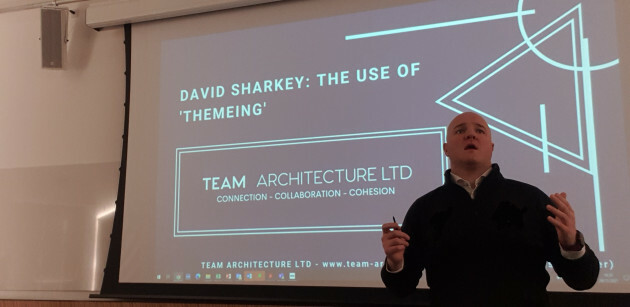ONE OF THE things Ronan O’Gara found most fascinating about the high-achieving Crusaders set-up during his two years in New Zealand was their ‘themeing.’
Head coach Scott ‘Razor’ Robertson’s use of themes made a lasting impression on the Irishman.
“It’s the heartbeat of the whole organisation,” O’Gara told us in 2018 when he was still with the Crusaders.
“It gives you a focal point every day, for every game of the season, and you can always refer to it and live it by your actions. That’s very powerful if you have 70-odd people doing it.”
With that in mind, it’s no surprise that O’Gara has brought themeing in at La Rochelle, who he helped to guide to the Top 14 and Champions Cup finals last season.
Fascinatingly, O’Gara has a fellow Irishman working with La Rochelle on a consultancy basis to design themes for the club.
David Sharkey is his name and here’s how he defines themeing:
“The use of an idea, theme, extended metaphor or storyline to illustrate, engage and motivate an individual or group over a period of time.”
Sharkey is a Mullingar man who works full-time as an English teacher in London and is also a rugby coach with the Honourable Artillery Company RFC, as well as now running Team Architecture Ltd.
Sharkey came on board with O’Gara and La Rochelle in the summer of 2020, and the success they enjoyed in their first season has seen the arrangement continue into the current campaign.
“He kept me on for a second year, so there must be something there,” jokes Sharkey.
He played rugby with Clongowes and UCD, where he studied English and History before deciding to become a secondary school teacher and moving to London for greater job opportunities.
He caught the coaching bug when he returned to work in Clongowes from 2012 to 2014, a time when Noel McNamara was making waves with the school. Returning to England to teach at Shiplake College in Henley, Sharkey’s duties involved rugby coaching.
His journey towards becoming an expert in themeing began through a project with his schoolboy team on masculinity in rugby soon after the 2018 ‘Belfast rape trial’ had dominated headlines.
“A light was being shone on the behaviour of rugby players and I remember being defensive at first, saying it wasn’t the rugby I had seen,” explains Sharkey.
“But then I stopped and thought that there actually had been behaviours in environments I had been in where maybe the way people spoke about women or behaved in terms of alcohol… those things were quite commonplace.”
Sharkey wondered whether sport could be used as a vehicle to develop people. He had heard coaches talking about ‘selecting on character’ but hadn’t heard much about how coaches could help to shape character.
So he spent much of the following season working with his young players on mental health, emotional wellbeing, and gender dynamics.
They would spend 15 minutes before training sessions discussing an aspect of mental health, for example. To focus on gender dynamics, they might analyse a women’s rugby game, holding up female role models like Emily Scarrett or Heather Fisher.
In 2019, Sharkey was becoming more familiar with the concept of themeing, partly due to Robertson and O’Gara speaking about the Crusaders’ work in this area during an interview with The 1014.
He decided to implement a theme with his own Shiplake players based around the 50th anniversary of the Apollo 11 moon landing in 1969.
“It was a way to tie all of what we had been doing together,” says Sharkey. “You could still talk about mental health, emotional wellbeing, and gender dynamics, but actually just theme it.”
Sharkey waded deep into the history of Apollo 11 and found many stories that could resonate with his players.
Take for example the astronaut Michael Collins who flew the command module Columbia around the Moon as the much more famous Neil Armstrong and Buzz Aldrin made the landing.
“He came to embody the tireless, quiet worker on the team,” says Sharkey, who asked his players who their Michael Collins was. Every single one of them pointed to the same person.
They spoke about hidden figures in NASA, bringing in the subjects of race and gender roles, as well as Aldrin’s alcohol addiction and mental health issues, and even grief in the case of Armstrong’s daughter dying at the age of just two-and-a-half.
“It helps that that I’m an English teacher with a love of history,” says Sharkey. “I could pick out stories that captured what I wanted to do. It was all about creating a series of lasting experiences that were memorable, unique to us, challenged us, and helped us shape character. Themeing was a way to do that.”
Sharkey has also been coaching adults at HAC RFC in recent years, running themes along with head coach Rhys Davies.
The club had a theme based around Ernest Shackleton’s escape from the Antarctic during the 2019/20 season and are currently operating with an Ayrton Senna theme.
Sharkey sees elements of themeing so often now across rugby. From Wolfpacks to Bomb Squads, he senses hints of it everywhere.
In early 2020, Sharkey wrote about his Apollo 11 project on his blog, The Great White Sharkey, and mentioned O’Gara and Robertson’s use of themes.
He was pleasantly surprised when O’Gara reached out to him suggesting they catch up but Sharkey didn’t hear anything further for a few months. After he then published an article with a framework for coaches on the use of themes, O’Gara got in touch again.
“I had no idea it would be a conversation about potentially working together,” says Sharkey. “I thought we would just pick each other’s brains about themes.
“Then ROG just asked if I would be interested in designing something for La Rochelle in a consultancy role.”
Given his full-time commitments elsewhere, the fact he wouldn’t be able to actually visit La Rochelle because of the pandemic, and his lack of the French language, Sharkey had to consider the proposal but it was too interesting to turn down.
He has now completed over 500 consecutive days of French practice on the Duolingo app and is a subscriber to the Canal+ channel on TV.
Sharkey designed a theme ahead of La Rochelle’s 2020/21 campaign which ended up being very successful even though there were two final defeats.
The actual content of La Rochelle’s themes is confidential but the club and its players have thoroughly embraced the concept.
A lot of Sharkey’s work is around O’Gara and his coaches’ pre-match and post-match presentations, while he also compiles videos for La Rochelle to help refresh the strands of their theme that they’ve covered in recent weeks and tee up what they’re moving onto.
Sharkey is in regular contact with O’Gara to discuss how themes are playing out, as well as constantly evolving their plans. Remarkably, they only met for the first time before last season’s Champions Cup final, after nearly a year of working together.
“We sat down and I said it was good to finally meet him,” says Sharkey with a laugh. “ROG said, ‘We haven’t met, have we?’ It was a bit surreal that we had developed this rapport and working relationship before we had actually met.”
Earlier this year, Sharkey launched his company, Team Architecture Ltd, and has been engaging with many other coaches, albeit not in as embedded a manner as he does with La Rochelle.
He has done some work with Westmeath football manager Jack Cooney and is always happy to speak about themes with fellow coaches.
So where does he start?
“The first question I ask coaches is ‘Why do you want to theme? What are you trying to dig into and what do you feel you’re going to get out of themeing?’
“You want to find a story that you belong to. If you’ve seen me write about Senna or Shackleton or Apollo and you think that’s going to work for you, just stop and ask why.
“Why is this a story that’s going to resonate with you and your players? How is this going to strike with the group you’re working with? How does it capture what you’re trying to achieve?
“Then consider some of the landmarks in that story. Who are the key individuals and key events, and how are you going to tell that story? You don’t have to do it chronologically. Your players might know some of the story – like Senna, they’ve seen the movie – so my job is to find an angle or an aspect they haven’t heard before or is lesser-known.”
Sharkey also highlights the values of ‘totems’ – physical objects that can help to bring the theme to life. When the Crusaders used a Muhammed Ali theme in the past, their man-of-the-match award was a pair of boxing gloves signed by everyone on the team.
Sharkey talks about the possibility of language being a powerful tool in themeing, as well as the importance of the theme being driven by people across the group and not just the head coach.
The Team Architecture package also offers observational help for teams, with Sharkey going into their environments and providing feedback to coaches on how they work with players.
He has been impressed with La Rochelle forwards coach Donnacha Ryan’s thirst to learn in this regard, while Sharkey also went into Ireland U20s camp when McNamara was in charge to provide similar feedback. The Mullingar man imagines the benefit of a club having someone full-time in such a coach mentoring role.
He has ambitions for progressing with his own coaching career too and wants to explore the idea of 1-to-1 coaching for players. But there is plenty to keep him busy in La Rochelle now and he has enjoyed being able to visit in person this season.
The French side have got their season on track after a bumpy start and are back up to fourth in the Top 14, with some exciting European clashes against Glasgow and Bath to come this month.
We will all be able to see exactly what happens on the pitch, but much of it will be driven by the work Sharkey and O’Gara are doing behind the scenes.
By way of summing it up, Sharkey cites a phrase that he feels captures what he tries to do with themeing.
“Teams are often at their best when they are playing for an idea.”




